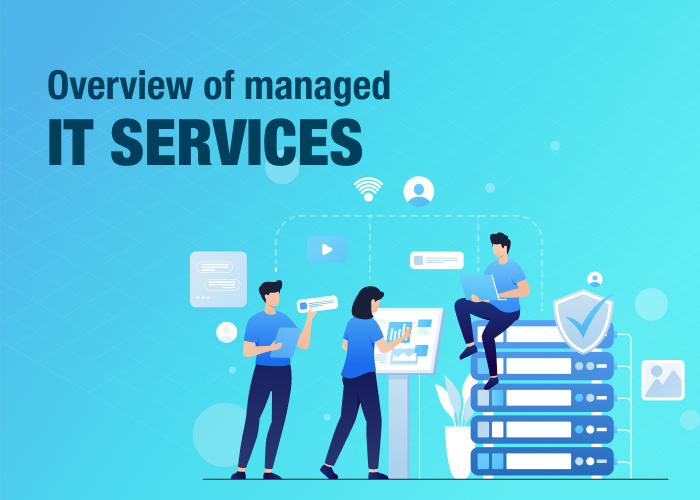Overview of managed IT services

The term ‘managed IT services’ describes the transfer of some IT duties and obligations to an outside service provider. Businesses that choose managed IT services usually do so to assign particular jobs and responsibilities to professionals so they may concentrate on their main lines of business. Usually, a service agreement or subscription is used to supply these services. Managed network, managed security, managed hosting, and managed backup and disaster recovery services are a few types of IT-managed services.
The general purpose of IT-managed services is to increase an organization’s IT environment’s efficiency, dependability, and security while freeing up internal staff time to concentrate on key business goals.
Advantages of IT-managed services
A number of advantages are there for companies looking for dependable and effective IT help from IT-managed services. Among the main advantages are:
- Less Stress and Responsibilities: Businesses may focus on their core organizational functions by having all of their IT framework and infrastructure management concerns removed by managed IT Services.
- No Need to Maintain IT Expertise: This gives businesses the flexibility to avoid constantly updating and maintaining their internal IT knowledge. MSPs help to make sure that the company stays current on the newest advancements and trends in technology.
- Greater and Deeper Experience: Managed services providers (MSPs) provide comprehensive IT services through a network of highly skilled and diversified individuals. As a result, the organization may obtain IT needs knowledge from a wide range of talent pools.
- No Internal Costs: An internal IT team is not necessary for organizations. As a result, these businesses may avoid paying for the expenses of recruiting, onboarding, and retaining internal IT professionals.
- Updated Infrastructure: MSPs will ensure that the network and IT infrastructure are kept up to date with the necessary patches, upgrades, and pertinent technologies for optimum performance and security as part of the fully managed agreements.
Disadvantages of IT-managed services
Although IT-managed services provide many advantages, businesses should be aware of any possible drawbacks. The following are a few typical drawbacks:
- Less Control: An MSP assumes a central role in overseeing an organization’s IT infrastructure, hence reducing direct control over IT strategy and decision-making.
- Lack of Internal Expertise: Without internal expertise, organizations may find it difficult to respond quickly to urgent IT demands or to make choices.
- Lack of On-Hand Expertise: When a company only draws on outside knowledge, it may put off decisions that need immediate action or specialized internal knowledge.
- More External/Outsourcing Expenses: While it is feasible to save money by not having an internal IT staff, businesses may discover that fully managed services have higher external/outsourcing expenses, especially if they require more assistance.
Difference between managed and co-managed IT services
- Managing IT: The MSP offers solutions regarding network, hardware, or software in managed IT service. Whereas, co-managed IT services entail an MSP and client partnership. Thus, the MSP is given particular IT jobs, duties, or projects by the customer.
- Integrating in-house staff: Co-managed solutions in this context refer to enlisting internal personnel to provide extra knowledge or handle after-hours assistance. Nevertheless, by taking on the responsibilities of an IT department, IT-managed solutions eliminate the need to hire, develop, and manage IT staff.
- Expenses: The client may incur greater charges for IT-managed services since they are responsible for all service costs. Co-managed services, on the other hand, involve cost sharing with the supplier, making them comparatively more affordable.
- Control over operations: By using IT-managed services, you might give up some control over your IT infrastructure because the MSP is in charge of managing all of your company’s IT resources. Whereas, co-managed solutions provide businesses more control by letting them choose which tasks to assign to an outside IT provider.
Conclusion
Managed IT services give businesses a strategic way to handle their IT requirements by contracting with specialist service providers to handle complete duties and obligations. With this strategy, companies can take advantage of scalable solutions, proactive monitoring, and expert knowledge without having to worry about managing a complete in-house IT infrastructure.
FAQs
What services are typically included in managed IT services?
How does the pricing structure for IT-managed services work?
What are the benefits of choosing IT-managed services?
Can IT-managed services be customized for specific business needs?
Are IT-managed services suitable for small businesses?
Shivangi is a passionate Copywriter at Alian Software with expertise in technical copywriting. She shares information that is easy to understand regarding business, technology, and trends.